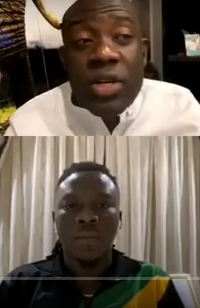Papa Penny – from entertainer to premier: ‘I can win back ANC votes, ahee’
The ambitious Tsonga music legend, who has won the hearts of South Africans with his eccentric suits and unique hairstyles, believes he can turn the ANC’s fortunes around in Limpopo.
Papa Penny, real name Eric Nkovani, is campaigning to contest against Premier Stan Mathabatha at the ANC provincial elective conference, scheduled for next weekend.
Though his campaign has been met with derision within the ANC, he said he was serious about becoming party chair as he wants to end tribalism, unite the province and ensure that services are delivered to the province’s many ethnic groups equally.
He told News24 he wanted to become premier to end the domination of “Pedi” premiers.
“In Limpopo we have seven languages, but we are governed by maPedi all the time and there is no change. Even at the Presidency, there has been change – we had Xhosas, moZulu and now moVenda,” he said.
Back to the glory days
Papa Penny stars in a reality show, Papa Penny Ahee, which chronicles his life as a musician, a polygamist who has fathered 17 children and a community leader.
He is currently an ANC councillor in the Mopani municipality. When asked if people should take his campaign seriously, given that he is better known as an entertainer, he said: “That is my gift from God, but an artist is a politician, more than other people, because they are singing about peace. We are bringing people together with music.”
A confident Papa Penny said if elected he would return the ANC to its glory days, when it attained more than 80% in the province at the polls.
The party has suffered a steady decline in electoral support as the EFF and the DA challenge its dominance.
“Once they vote for Papa Penny, I am going to take the opposition down, we are going to win more votes. I will grow the ANC because I know how to campaign, I know how to talk. I am a public speaker and people believe in me and I believe in them,” he said.
Few people are even considering Papa Penny as an option for the top post. Mathabatha is widely expected to cruise through the contest to return as chair, after getting the backing of his biggest critics, the ANC Youth League in the province.
Tribalism is alive
Papa Penny emphasised his claims that tribalism was alive in the province, saying some ethnic groups are sidelined in the delivery of services.
“We don’t speak about tribalism but we see, eat and sleep it. That is wrong,” he said.
He pointed to the longstanding feud between residents of Vuwani and Malamulele that divided the communities along tribal lines, with one group refusing to be governed by the other.
Papa Penny accused Mathabatha of not leading by example but instead sowing tribalism in the province.
“I have been fighting with him that he is not fair, because in his executive there is not a single MEC who is Shangaan (Tsonga). We have also lost a lot of artists that are our legends, but he never attends the funerals. When we lost Ray Phiri he drove from here to Mpumalanga to say Phiri must rest in peace,” he claimed.
He also accused the government of neglecting Tsonga-dominated areas, lamenting that the main hospital, Khensani in Giyani, had all but collapsed with patients who suffer major injuries during accidents forced to go to Polokwane hospital, which is about two hours away.
‘There is no quota system’
Mathabatha’s spokesperson Kenny Mathivha has dismissed the claims. He said the province had always been plagued by allegations of one ethnic group dominating the other in various departments and spheres of government but there was no “scientific” proof.
He said all premiers since the dawn of democracy had strived to include all ethnic groups in their executives.
Mathivha dismissed Papa Penny’s claims that Mathabatha’s executive did not have Tsongas, counting at least two MECs.
“There is no quota system of how many you have, maybe Venda people should complain because there is only one in the executive,” Mathivha said.
“The person who is raising this is the most tribalistic person,” he said.
Papa Penny defended his campaign to become ANC chair, claiming to be the best councillor in the country working for the people.
“I am good to people. I am born in a poor family (sic). I work for people. I don’t want to see people marching for services, burning schools, those things are caused by divisions of calling ourselves by the language we speak. We have to create jobs, renovate our schools and clinics,” he said.





